August 29
Great breakfast with Kipharts, Olopades and Barbara Ghansah, who is in charge of operations for three West Africa countries, including Ghana, for Root Capital. Root was formed by Willy Foote, a young friend of the Kipharts, and has made $300 million in loans to people in Africa, South America, India and elsewhere. The loans are not micro loans, but are to sources who could not get a conventional loan and who produce a social good, whether through providing employment to people or otherwise. Much of Root’s work is in agriculture. Dick thinks Willy is fabulous, and talks about him all the time.
Barbara is a young, former banker, who clearly knows what she’s doing and is sensitive to the cultural issues that make doing business in countries challenging. She is definitely interested in/planning to go to Nigeria with Root, and is looking for the right connections. We were excited to tell her all about our experience, both in Ekiti, with the minister of agriculture, and at Idaban University, with the agriculture faculty members. Something good is going to come of this, though it may take a while. Very exciting meeting.
We drove to the pineapple farms that Dick and Joe own, with Joe and Daniel, and saw the fabulous development that’s been going on there.
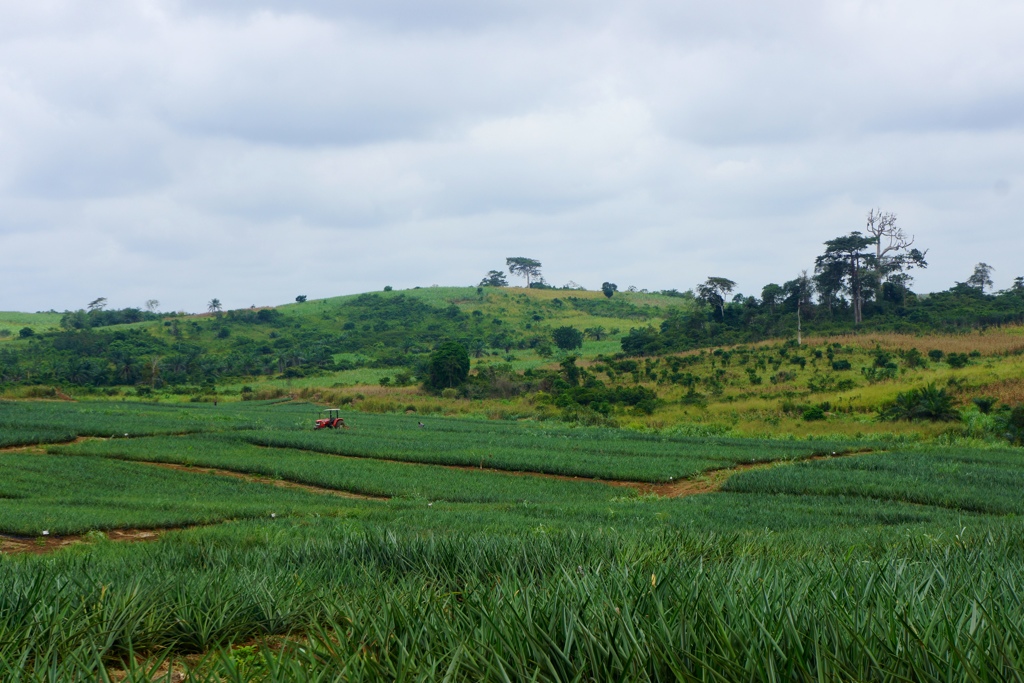
Joe is very proud of what has been accomplished and is focused on reaching break even, which he thinks will be accomplished next year. Daniel is far more aggressive and wants to expand more quickly than Joe, utilizing more of the 2,500 or so acres they have under contract. Dick is inclined to be aggressive, too, but places great stock in Joe’s opinions.
We met with a couple groups of workers in different areas of the pineapple farm, each meeting starting with a prayer.
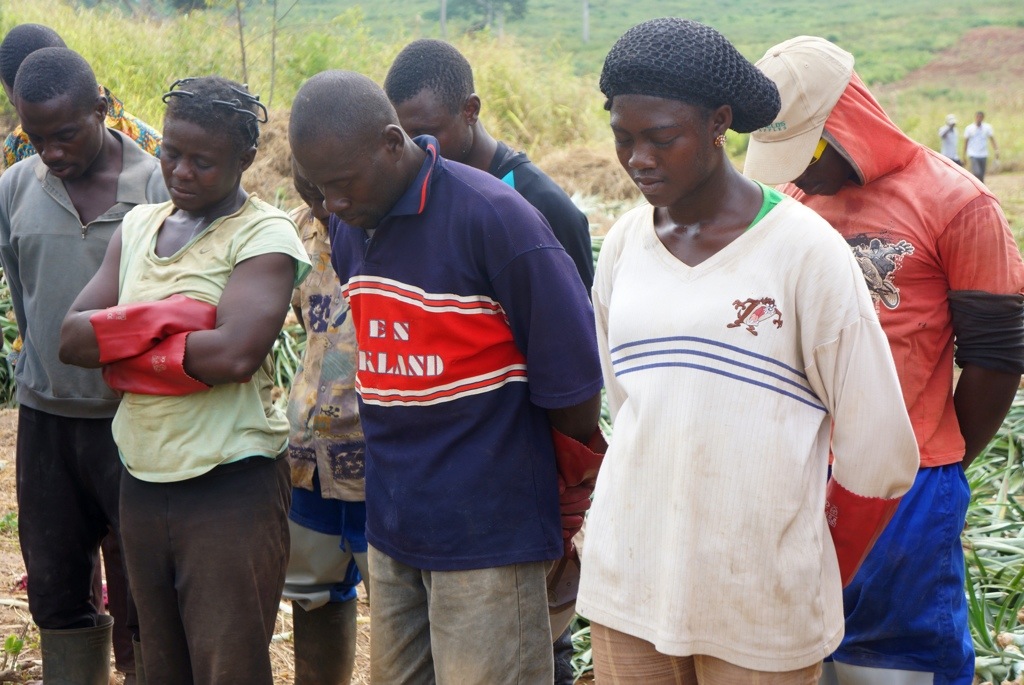
This was not a show for us. Joe is very religious and these prayers are done daily. The prayers are punctuated with “amens” and “hallelujahs”.
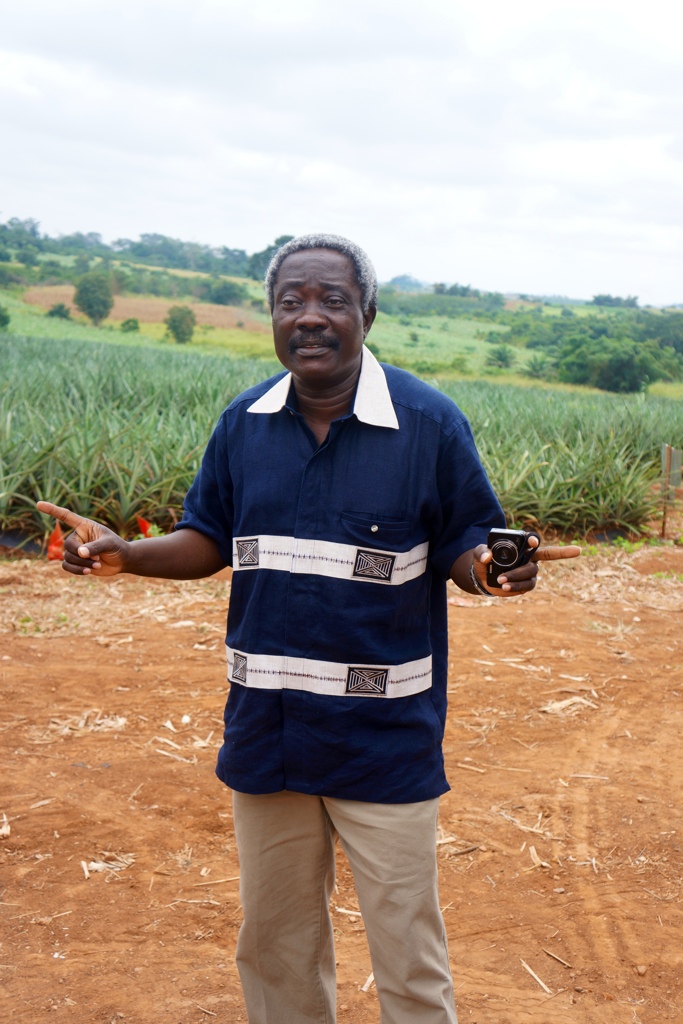
Joe introduces all of us, and gives the workers pep talks, telling them that they don’t have to ask for wage increases, “the farm will tell them” when to increase wages, as it becomes successful. Dick tells Joe (out of the workers’ earshot) that he thinks they should give employees a bonus at Christmas, based on the number of months they’ve worked. Apparently, both “the farm” and Dick are able to make those economic decisions. We watch the workers who are joyous, singing as they work. Again, this is not for our benefit; it’s how they do it every day.
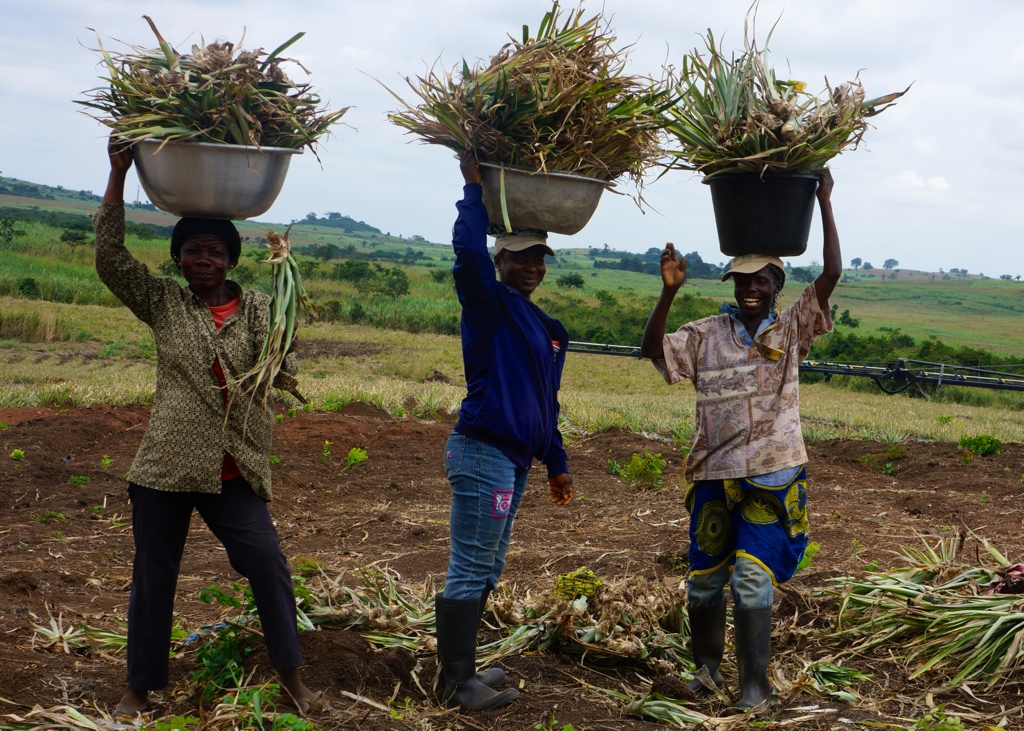
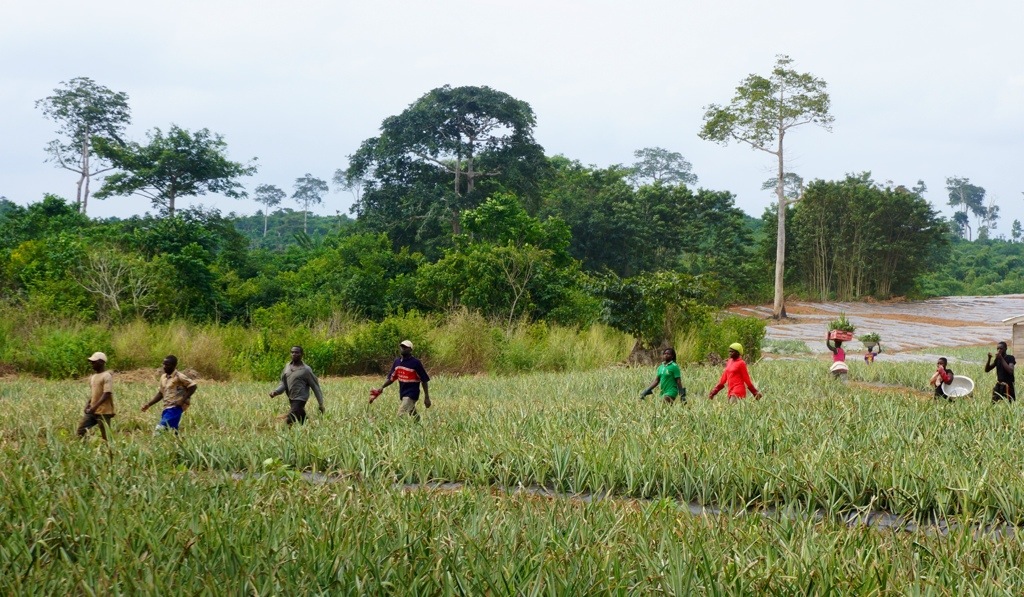
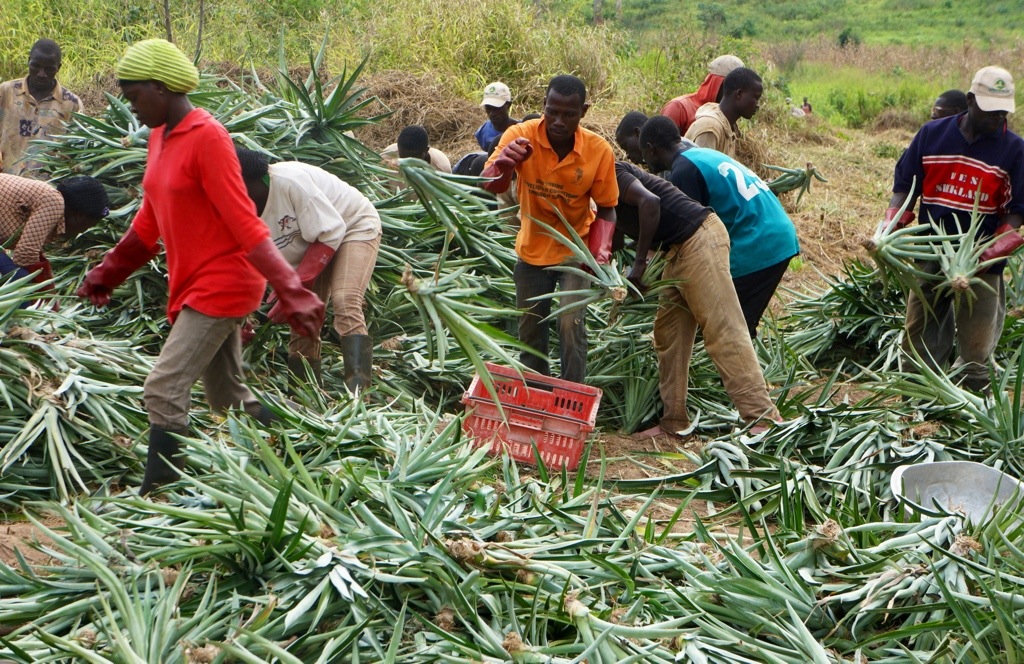
We also drive to an area of the farm which has been planted with almost 100 acres of mangoes.
We go next to three villages to dedicate wells that have been donated in gratitude for the cooperation the chiefs have given Joe in the pineapple operation. There are short speeches (Joe has made it clear that we have very limited time), considerable greeting and hand shaking with chiefs, linguists and queen mothers, among others, and, finally, ribbon cutting to inaugurate the wells.
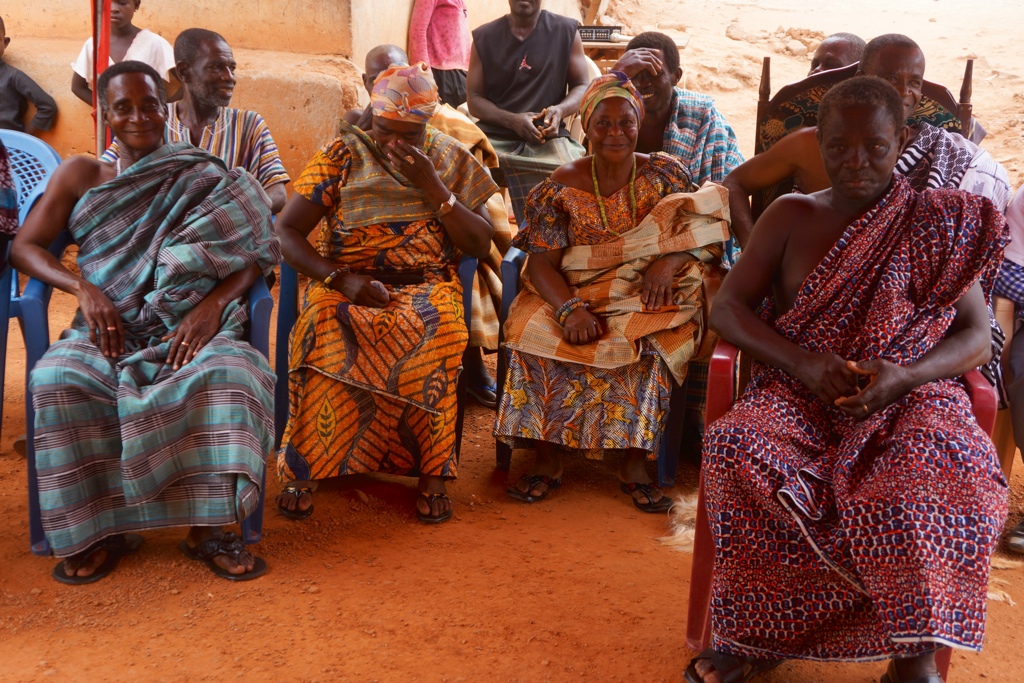
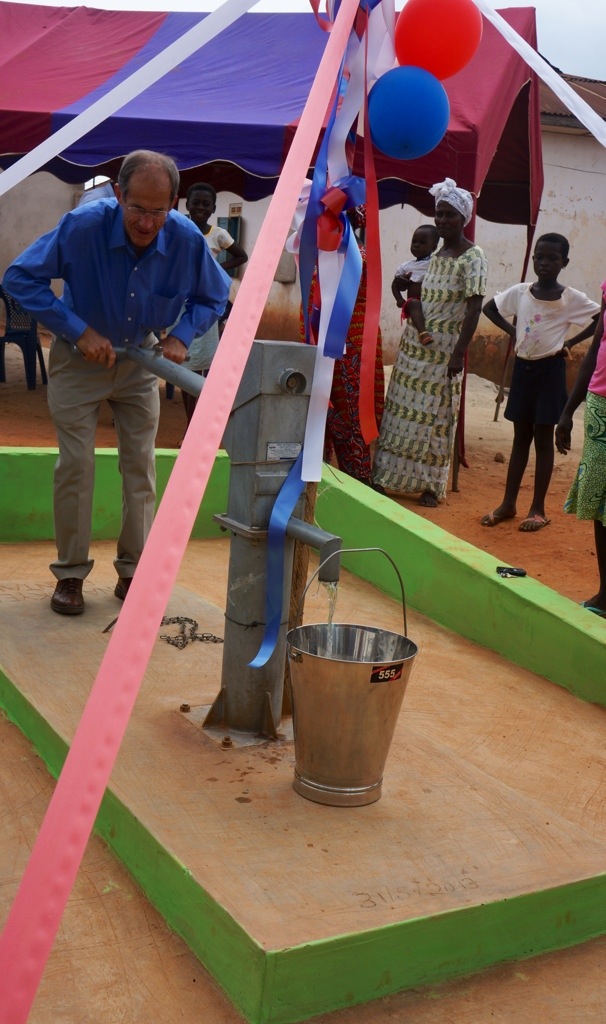
Cute kids hang around the area of the ceremonies.
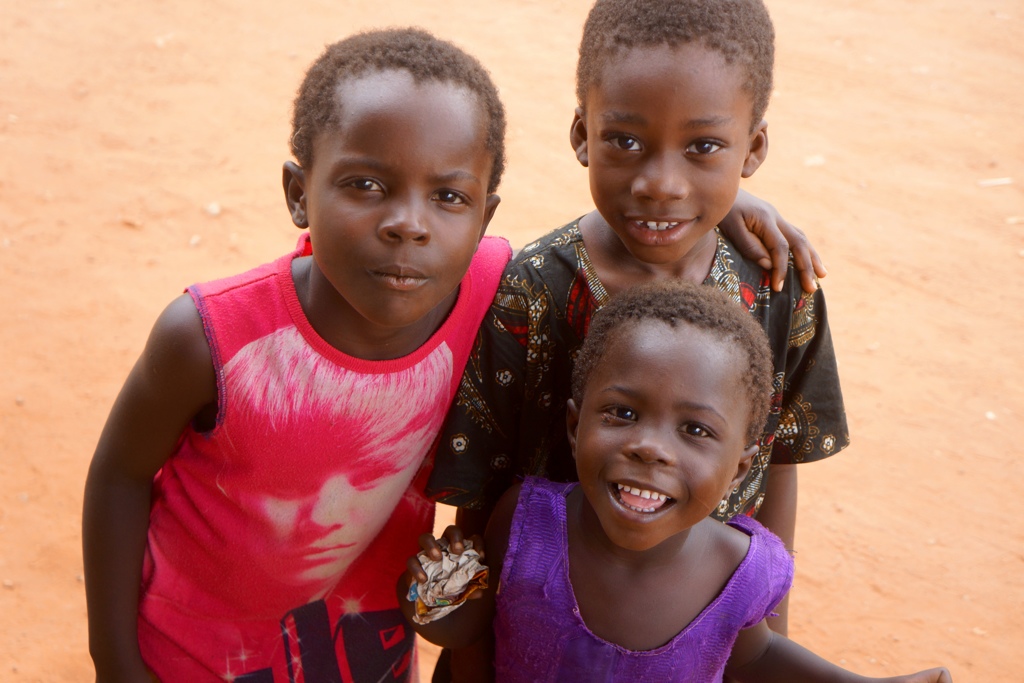
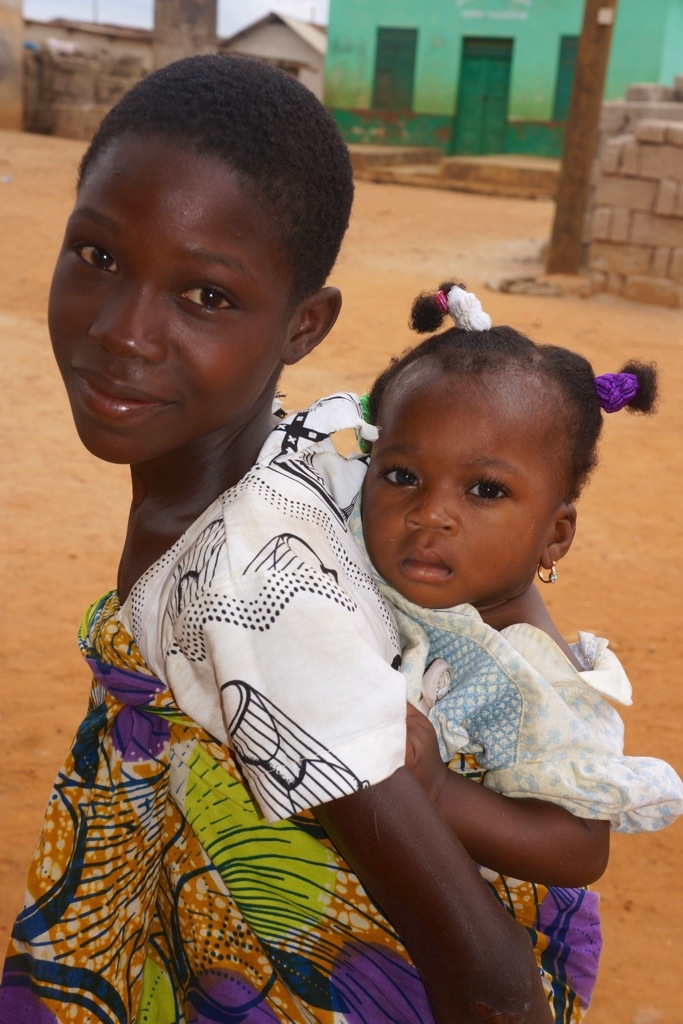
Interestingly, the three villages seem to have their acts together to different degrees, from the first (least) to the third (most). Sola reported that the first chief tried to talk to him about moving to the U.S. Sola advised him to focus on improving things here in Ghana.
We drive to the school for the deaf, which we’ve had very moving visits to in the three prior years. Joe and, his wife, Ida, have been very active in the school, and the Kipharts have supported it financially. This time, school is not in session and we are stopping there only so that Dick and Susie can be interviewed for a video that’s being made to promote this and other schools that have school farms to teach kids agriculture.
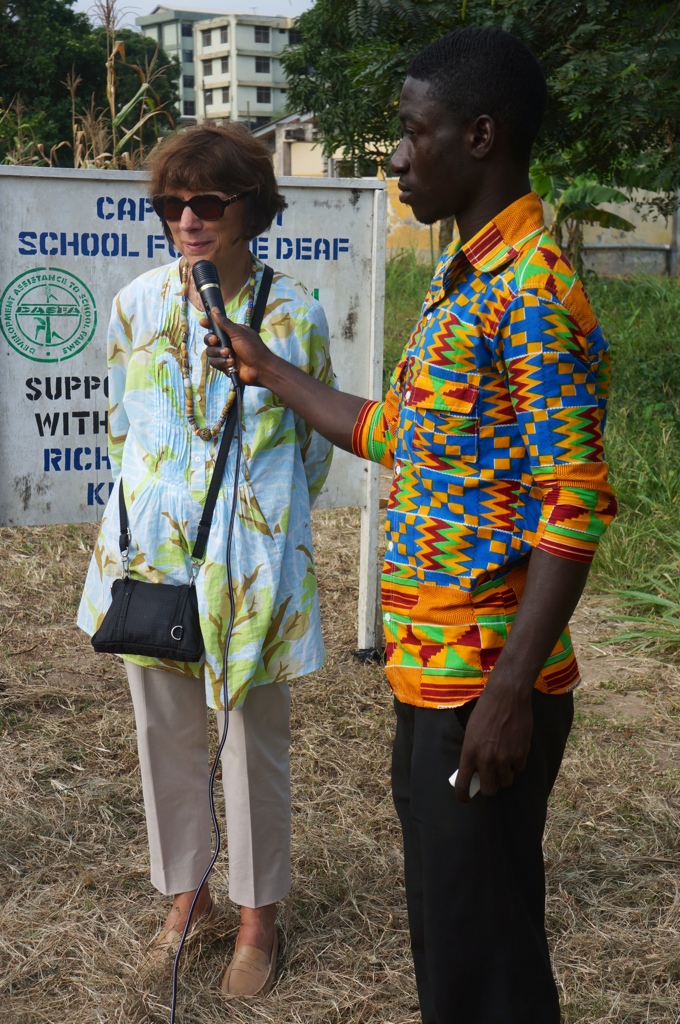
After the interviews, we drive to the comfortable Elmina Beach Resort, at which we’ve stayed three times before, check in and relax (blog) for an hour and a half before dinner. Conversation at dinner, which includes Joe and Daniel for most of it, centered on strategy for various meetings we are having tomorrow. Funmi had to leave for a phone call, the Kwartengs left and, after a while, the Kipharts, Sola and I were walking out of the restaurant when we ran into Funmi, who said we had to return to the table, because she needed a consultation. We spent forty minutes discussing a difficult personnel issue at the U of C, settled on an approach for Funmi and finally all left the restaurant–for real. This trip is great, even when we’re talking about matters completely unrelated to the trip, speaking of which, we also had a discussion of the merits of match.com (the consensus was very positive). (During dinner, Dick got an email from Willy Foote, who’d been in contact with Barbara, and expressed interest in our Nigeria experience.)
August 28
Awoke early and utilized something I learned earlier in the trip. When you see a bucket in the bath tub, you can use that for showering. Cuts down on the singing a bit, but certainly conserves water. Though HLF House (Healthy Life for All) is unlikely to be a target for a Four Seasons takeover, it works well for a night, saves hotel bills and is a great facility for the Global Health Initiative (GHI).
My two problems on awakening were lack of Internet connection and wet laundry, in the scheme of global health issues, those are not all that serious. The first has already been solved, courtesy of Christine, who is in her final year of medical school at the University of Chicago and doing a second stint in Nigeria through GHI. Her work is dealing with the economic impact of catastrophic illness as it relates to the economic barriers to providing good care. This is a perfect example of the interdisciplinary approach that the Olopades take to global health. The second problem requires figuring out what to do with wet laundry en route to Ghana later today. Another cultural disconnect was my assumption that when the staff at HLF said they’d do the wash, they’d then just throw it into the drier.
This day, or really half a day was packed with meetings/tours. I won’t give you details of them all because I didn’t fully understand all of it and couldn’t possibly remember it all, if I did. We started at the teaching hospital of Ibadan University, with which GHI partners. We saw the lab where DNA was gleaned, frozen and sent to GMI for compilation and analysis. The head of the lab explained the expensive new machinery and process.
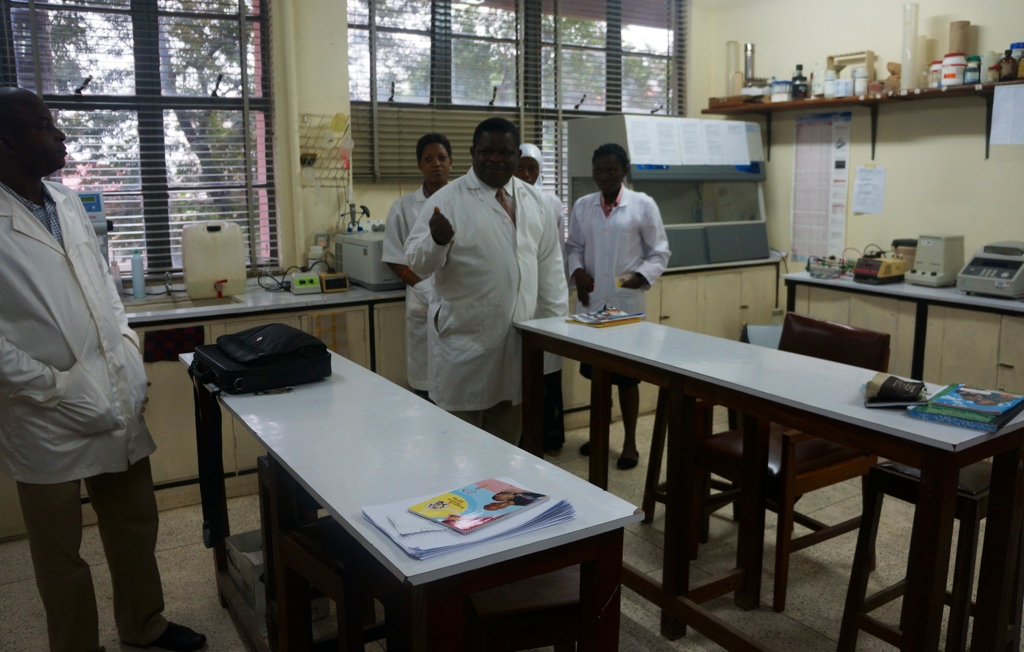
The work is designed to identify genetic differences in various populations who have breast cancer and other diseases with a view to developing appropriate medication and interventions specific to those populations. Multiple disciplines are brought to bear on the process, including microbiology and pharmacology, and we are introduced to all of the people in the lab doing the work.
From there, we went into a larger room, where again we discussed the work being done by Ibadan and GHI. Among the more interesting discussion was that by an OB/GYN doctor, Dosu Ojengbede, who had been doing work in combatting high maternal death rates due to hemorrhaging because of the inability to stem the bleeding before help could be provided. This was a particular problem in remote rural areas, and acute in the northern, Muslim areas. Dosu hit on the brilliant strategy of educating the imams and, through them, reaching people who needed the help.
Dosu had a polyurethane wet suit designed and contracted with a Hong Kong company to manufacture them. They cost less than $200, but, because they can be reused, the cost per use was about $5. The suits, of which he brought an example, look like scuba diving wet suits, with modifications designed to push the blood of the birthing mother up into her body, rather than letting it drip out. Another very simple clear bag allows people to collect blood and through colored markings on the bag, so that people don’t need to be able to read or figure out numbers, shows when certain danger levels are reached. Dosu discussed other interventions being made, which I won’t go into. All of this is very exciting.
After this meeting, we returned briefly to the house to collect our luggage and, in my case, pack some still slightly damp, but now ironed, clothes. From there we rushed off in our van to the office of the Vice Chancellor, who had thrown last night’s party, arriving some twenty minutes late. The Vice Chancellor had assembled a team of about 8-10 deans and professors who focused on agricultural matters. A simple lunch was served while we talked. Included in the group was an American professor, who had married a Nigerian doctor and moved here forty years ago. She took a sociological approach to agriculture and had outspoken feminist views that she was not bashful about sharing and confronting the men around the room with.
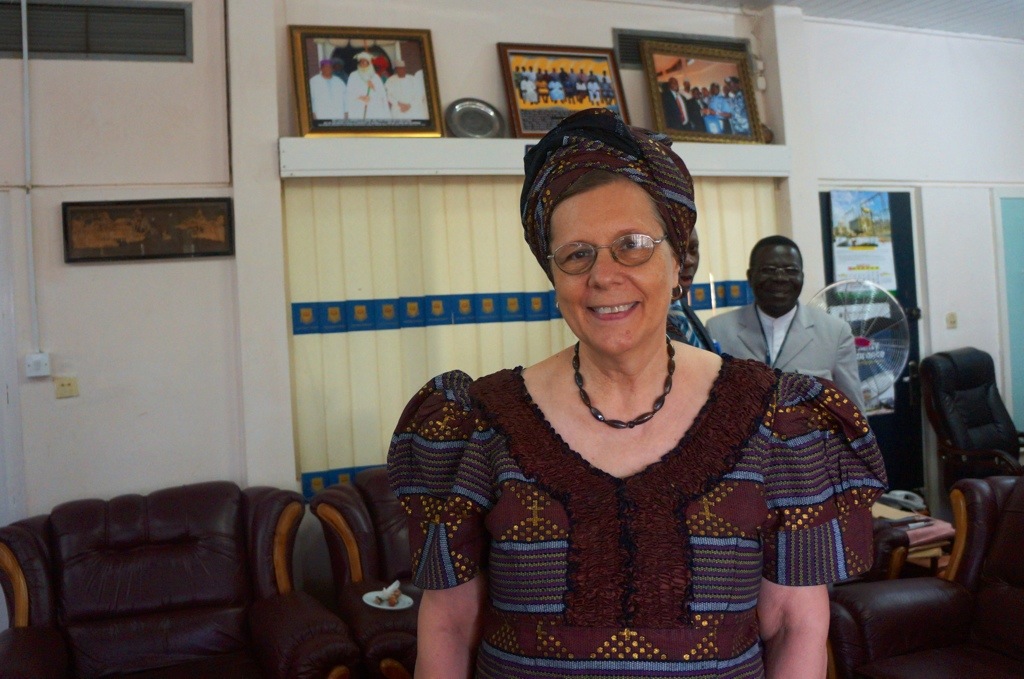
These various meetings give us an appreciation for the strong relationship the Olopades have established with many people at Ibadan, the fascinating, interdisciplinary nature of their work and the esteem in which they are held by everyone there. It’s a unique opportunity to witness global health in action.
We discussed many aspects of the work the Ibadan professors are doing in farming, both crops and catfish. The Kipharts are very interested in agricultural issues, and knowledgable about them. I was able to raise a couple questions about catfish farming, because I’d represented an insurance company/client in their investment in a catfish farm in Florida some thirty-five (or more) years ago.

We rushed over for a quick tour of the catfish farm, and, afterwards, were presented with a bag of gifts by the Vice Chancellor as we entered the van to the airport. We sped off, led by a truck with siren blaring (we still have the truck, but, alas, have lost the armed guards. At one point, we had a team of nine looking after us, but were down to only six now.). We had a harrowing ride, weaving in and out of traffic and avoiding potholes, as we tailgated our escort. It felt a bit like being in a video game in which the object was to reach an airport, driving as fast as possible, while staying as close as possible to the vehicle in front of you and avoiding car and pothole obstacles popping up suddenly in your way. If you make it safely to the airport, you get to play again some other day.
We get to play again. Lagos airport is crowded and we endure the usual delays and indignities, but make it on time for our short, 45-minute flight to Accra. I’m the first of our group to make it through customs and collect luggage, so I go out to the lobby to see Joe Kwarteng and his son, Daniel. Warm greetings from both, including a big hug from Joe. We chat while waiting some time for the others to make it through. More warm greetings between the Kwartengs and the Kipharts and Olopades. These are nice moments, evincing a strong friendship and family feeling that exists between all of us.
Interesting extraneous fact: Sola used to play cricket on the Nigerian national cricket team.
A van from the Golden Tulip takes us new arrivals the less than ten minutes to our modern hotel, while Joe and Daniel, who drove in to greet us from Cape Coast meet us there in their car. A ridiculously long and confused check-in process resolves itself and we go to our rooms. Twenty-five minutes later, we meet the Kwartengs in the lobby and go down for quite a good buffet dinner. The Olopades are meeting people from the pharmaceutical company, Navaris. They introduce us to the Navaris people, but we eat separately.
The Kipharts, Kwartengs and I spend most of our dinner discussing the pineapple farm in which Joe is a partner of Dick’s, and which, Daniel, a business school graduate, is running with great enthusiasm. We also discuss the problem of how to get young people interested in the less-than-glamorous field of farming. After the Kwartengs leave to drive back to Cape Coast, the Kipharts and I discuss how amazing the Olopades are, and how privileged we all are to be able to take this kind of trip together.
Up to the room to shower and collapse.
August 27
Started with breakfast at the hotel with Funmi’s cousin, Ayo, who is a lawyer and one of twenty-six members of the Ekiti Assembly, which is akin to our House of Representatives. He seems very committed and in tune with the governor’s program. Ayo will be visiting the US next month and we hope to see him in Chicago.
En route to Ibadan, Funmi got a call that there was a meeting of kings that the governor wanted us to attend. We drove to a sports stadium, where a huge crowd had gathered for an event for the Council of Traditional Rulers, an attempt by the governor to reach the grass roots through the local kings. The stands were packed with kings and their wives in very festive dress.
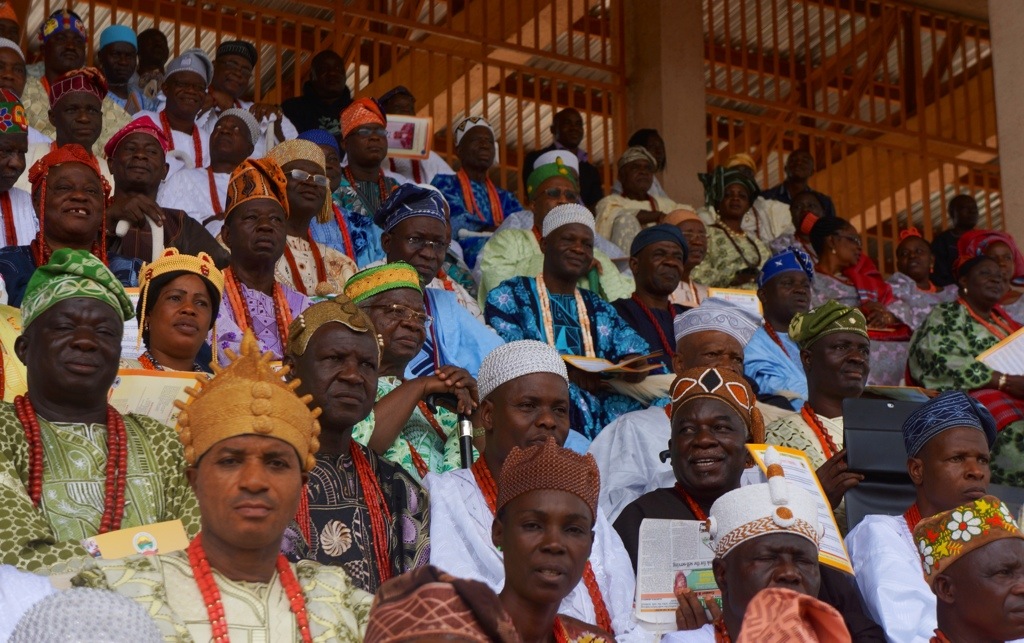
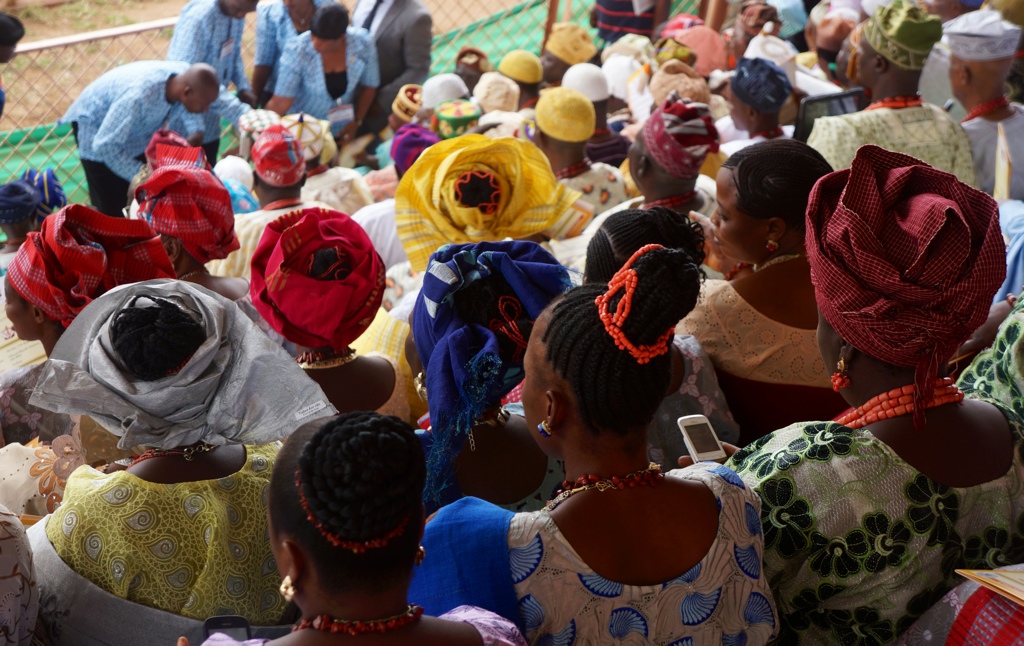
Lining the field were some 100 new SUVs, which were to be gifts to the kings from the governor. Speeches were made, a popular comedian MCed and music was played at what turned out to be quite a spectacle.
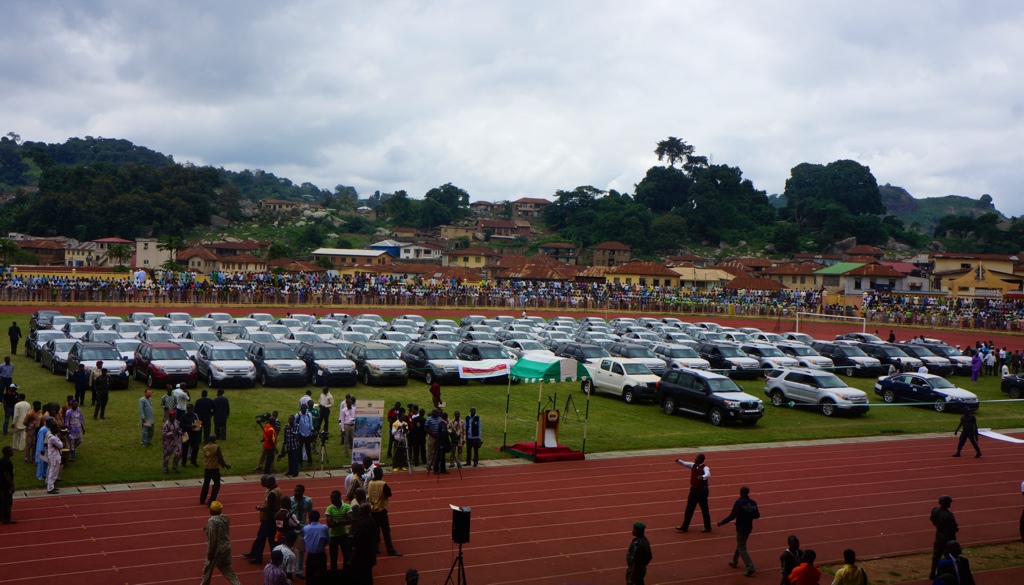
We drove on to Okeigbo, where a farm house Sola’s father had built for him more than thirty years ago is located. The house is large and solid, and has mountains in the background. Sola has never lived there and has somebody take care of it for him. As we drove away from our short visit, Sola said, touchingly, that he felt his father’s presence in the house.
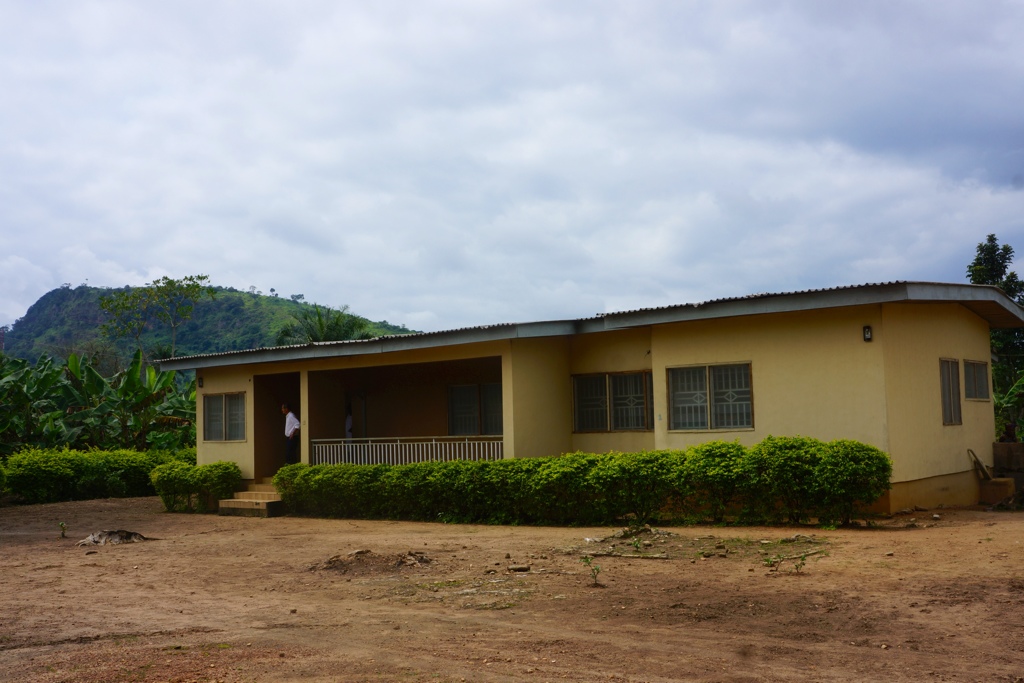
We stopped at Obafemi Owolow University, which the Global Health Initiative at the U of C partners with. As the doctors were on strike, there was nobody to see and, despite Funmi’s incredible presence all over the world, it took us half an hour to get into a bathroom. Comforting to know that there are some limits to her powers.
Driving on, we came upon the obelisk, called Opa Oranmiyan, in Ile Ife, where the first human is reputed to have existed, the obelisk being the staff of one of seven warrior sons. Our chief security aide, Moses, says that the staff, miraculously, has grown larger, but Sola appeared a mite skeptical about that report.
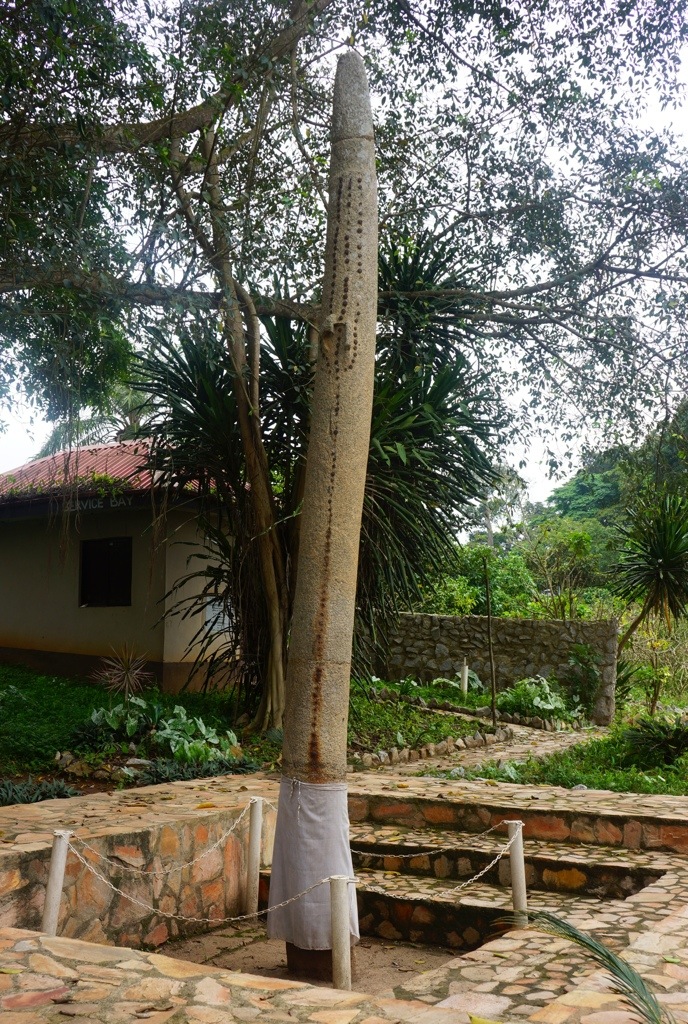
I transferred to a car with Carol (and, of course, a driver and guard) to ride about an hour to a spot on the highway where the van pulled over. I transferred to the van and we all said goodbye to Carol, who was driven on to Lagos for her flight back to Chicago. It was great having her and we’ll all miss her for the rest of the trip, especially me.
In Ibadan, we drove to the house that the Global Health Initiative uses as its headquarters in Nigeria. There, Sola met with a team of about a dozen students in various disciplines, who were doing research on the impact of distributing small metal ethanol-burning stoves to be used in cooking in lieu of burning wood inside, which creates horrendous medical problems, and some 4 million preventable deaths annually due to indoor pollution.
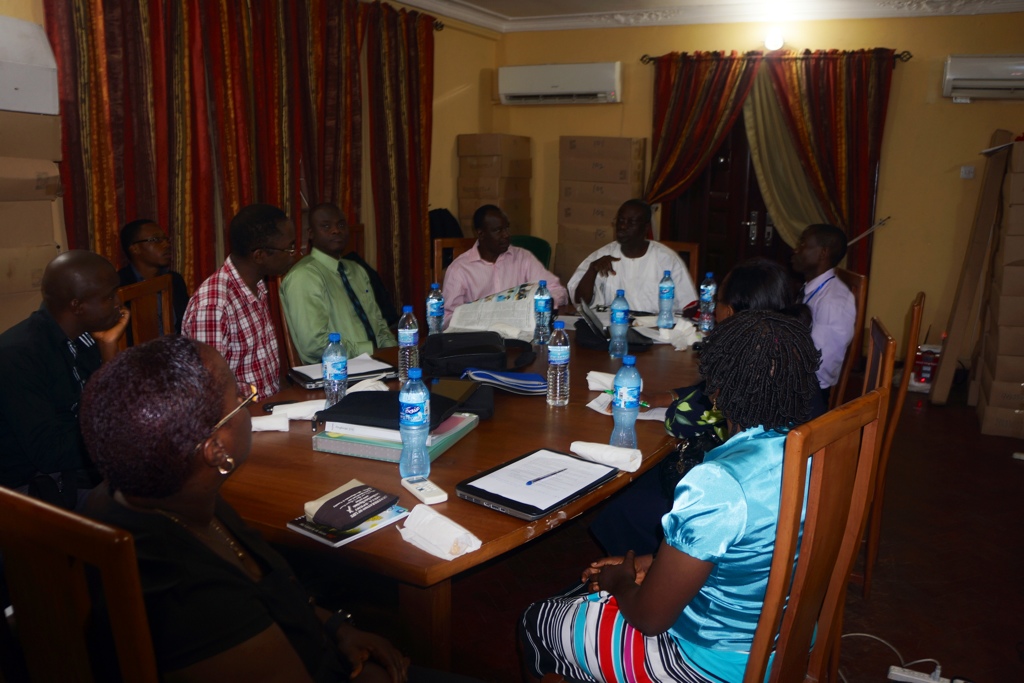
Later, we saw the compact stoves, which can be bought for as little as $20, and Sola thinks may cost even less in the future. The students seem motivated and energetic, and Sola praised their work.
Next we drove to the home of the Vice Chancellor (President) of Ibadan University, a very prestigious school that claims the Olopades as two of its distinguished graduates. While we expected only a few people would be attending, in fact it was a lavish affair with fifty people who constituted deans and elite professors at the university, with live music during dinner. The Vice Chancellor was unstinting in his praise of the Olopades and the Kipharts. Conversation over dinner was very interesting, and both Dick and Susie gave brief remarks after dinner. Clearly, the university is hoping for projects with the Kipharts in the future.
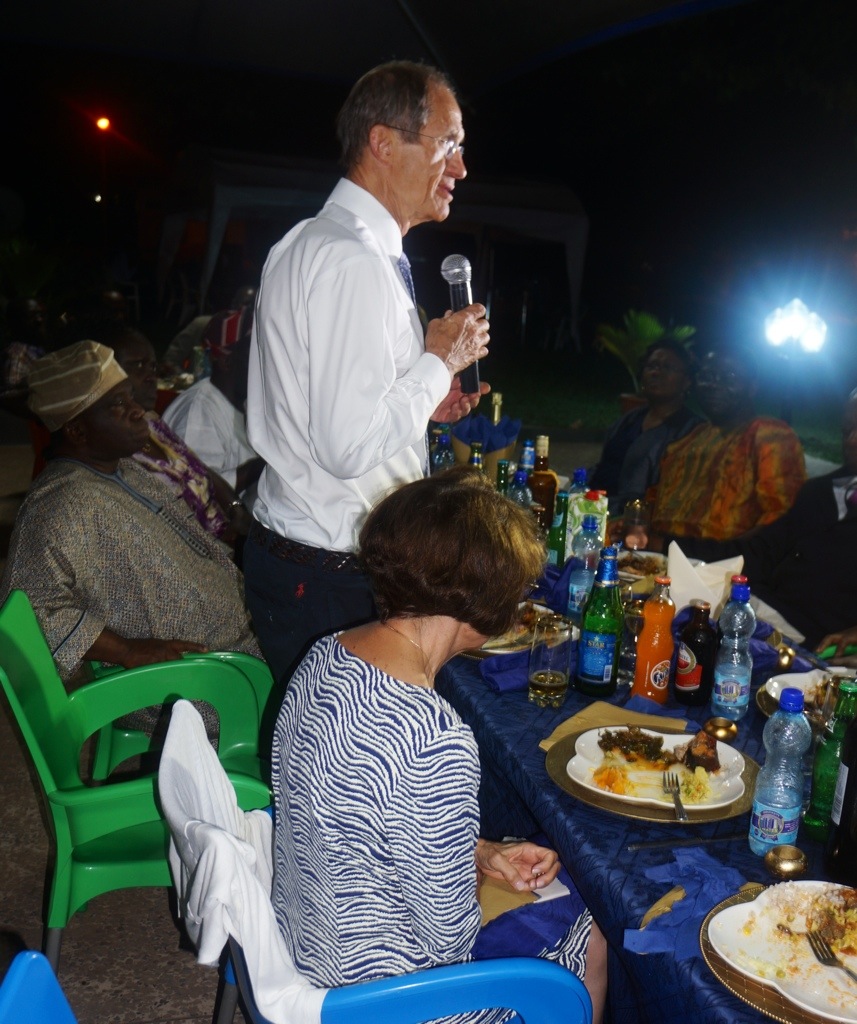
Back to HLF House to blog and sleep.
August 26
Breakfast at the hotel, then waited outside for our escorts, who were late. Struck up a conversation with a woman dressed in a stunning native dress. Turned out that she was a doctor, had a practice in Connecticut and was developing one in Ekiti, and knew that her husband was a classmate of Funmi’s, thus confirming once again that everyone knows Funmi. (He was also a classmate of Sola’s, but did not know him. Sola explained that he was a partyer and cricket player, so did not know studious types, but that Funmi bridged the gap between the two groups. Sola also told us, later in the day, that as a young man, he’d traded his car for a motor bike. One would not predict that Sola was a wild and crazy party guy, knowing him today, but I guess you never know, do you? We run into our hotel doctor/friend again at the market outreach event later in the morning.
Our car came and drove us to the governor’s house, where we met with Debo, the minister for trade and innovation, and a couple other ministers for long discussions on education, teenage pregnancy and a few other topics. To be honest, I’m a bit hazy on the discussions, since I was busy finishing and posting yesterday’s blog. We, the Kipharts and the Olopades had taken Debo and his wife to dinner at a Mexican restaurant when he visited Chicago a month or so ago (the meeting arranged, of course, by Funmi).
After the meeting we were driven to a “market outreach” event at a Women’s Market, arranged by and attended by Bisi (Erulu Bisi Fayemi), the governor’s wife. It’s tough to describe the event, since it seemed part to support the market, part religious, part music (drumming and singing), part dance, part colorful fashion show (each group wearing a different color/patterned dress and head scarf), part speeches ranging from financial matters to health. The event was infused with incredible spirit, energy and enthusiasm. One of the speakers was the leader of the women marketers, who complained in addressing the governor’s wife that she (the speaker) had not been adequately informed and included in planning the event. When the governor’s wife spoke, she praised the leader for her candor and led the group in giving her three cheers. Evidently, speaking truth to power occasionally pays off. The market women hold significant economic power and are a force to be reckoned with. This event clearly will be among the most memorable of our trip.
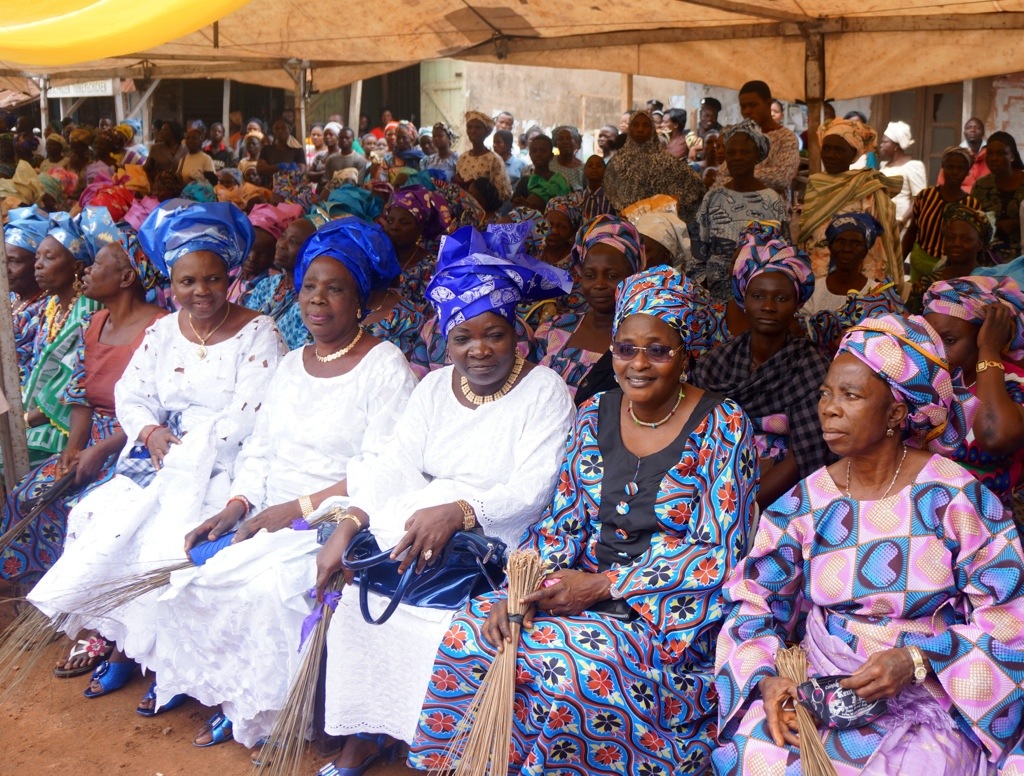
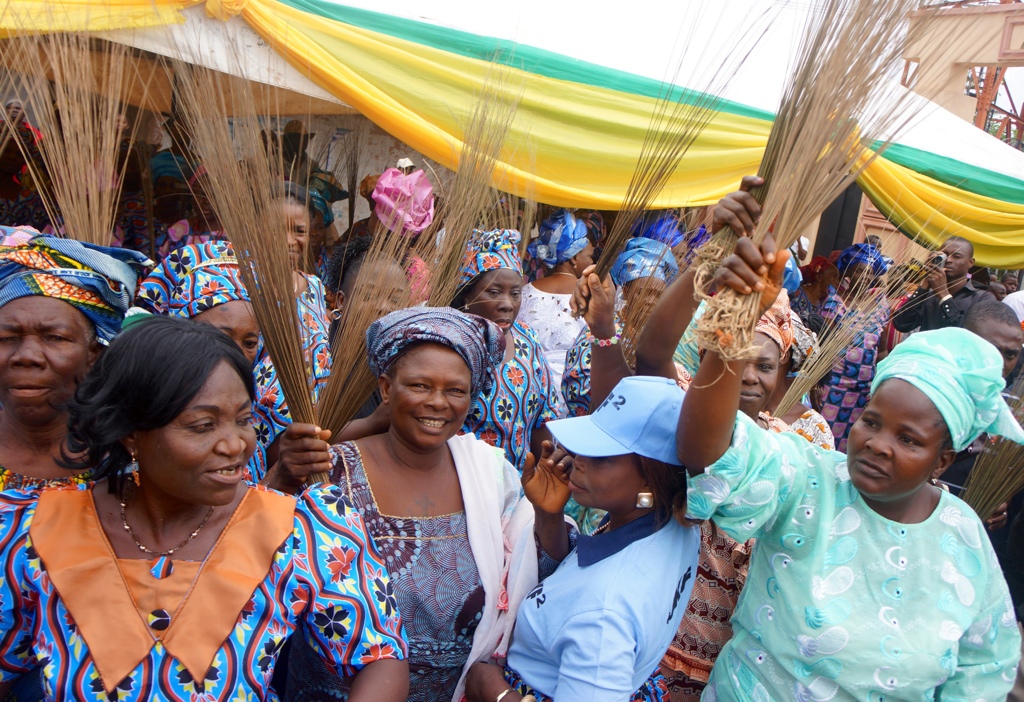
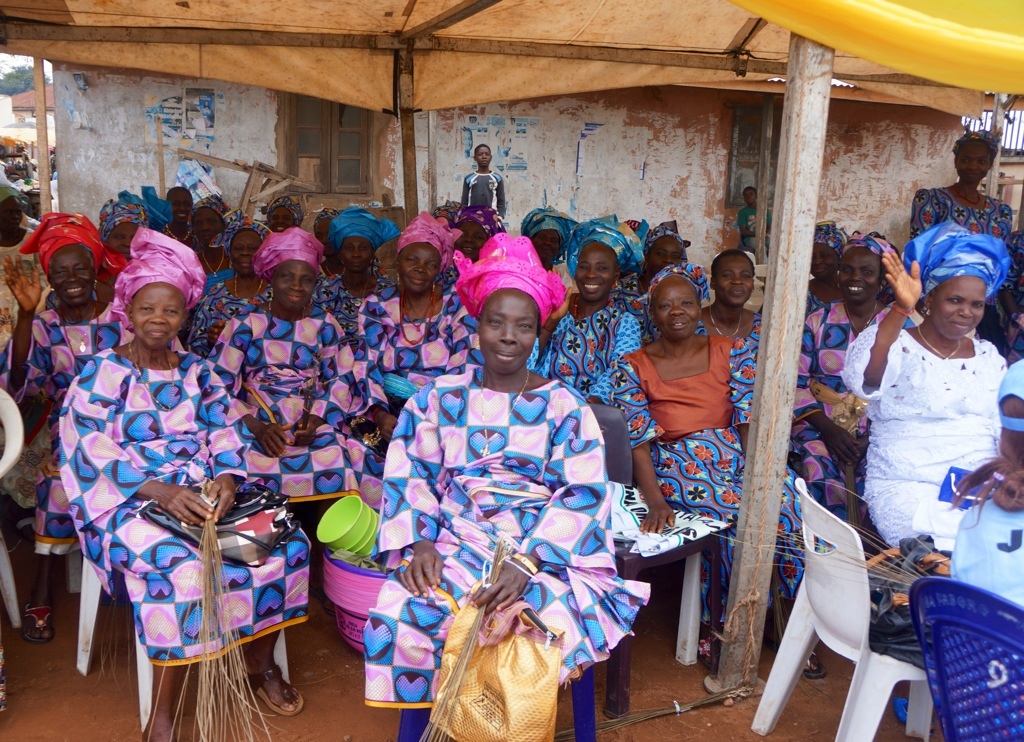
We sped off, winding rather crazily with our escort’s siren blaring from time to time. Funmi assured us that this was not typical Nigerian driving. They were driving us this way “because they could.” Our protocol people seem hell bent on getting us to our next spot, dead or alive. (Speaking of roads, here’s an extraneous observation I should have made a couple days ago. The highways from Lagos to Ibadan were loaded with hundreds, probably thousands, of oil tanker trucks carrying oil from the eastern oil fields.). Wherever we go, we are accompanied by two men in uniform, with rifles. When I asked Sola about the need for this, he explained that we were guests of the state, and they wanted to make sure we were safe from kidnapping, as we might be a ready target (especially if we had been traveling up North, which we are not). I guess this is comforting, or maybe not.
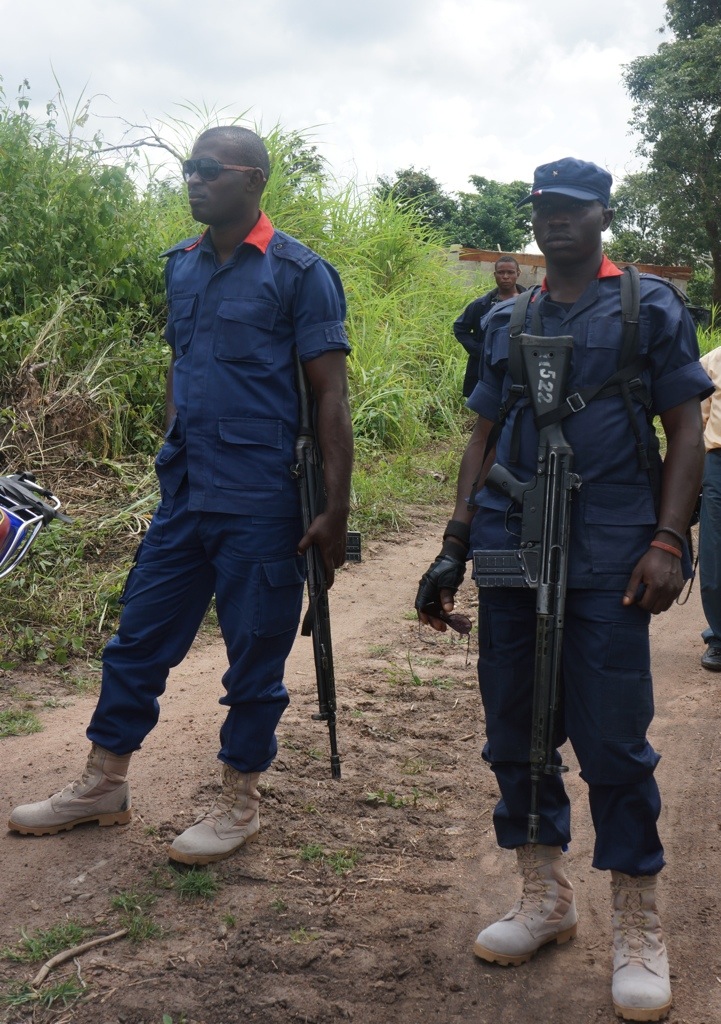
We were joined in our van by the Minister of Agriculture, Babajide Arowosafe, who was formerly with the United Nations in development, the permanent secretary in that ministry, Mike (I may have made that name up. Permanent secretary is the highest rank one can attain in the civil service in which Mike had served for more than twenty years. The idea of permanent secretaries is to give the ministries continuity beyond the term of a particular governor.), and a consultant to the ministry, Miles Gaisford, who was from Zimbabwe. All of us were extremely impressed with the three agriculture people. Unlike the government officials we’d met in Ghana, these people seemed very bright, knowledgeable in their areas, with well thought-out and practical plans for moving Nigeria’s agricultural world beyond subsistence farming. They had built a dam, which we visited, come up with a plan to help farmers by depositing some $10,000 in an account for each on which they could draw for seed, supplies, etc. in a way such that expenses were paid directly, i.e. the farmers did not have access to the money themselves, negotiated land development deals with foreign countries and induced some talented young people with engineering degrees to go into farming, rather than engineering. The ministry is aiding the farmers in forming cooperatives that will give them both buying and selling power. In Miles, they had hired somebody with broad experience, who seemed both knowledgable and willing to listen to others.
We went to see the dam, then drove on to see some cassava that had been planted, together with maize that produced two crops a year. The cassava was part of an expansive land area.
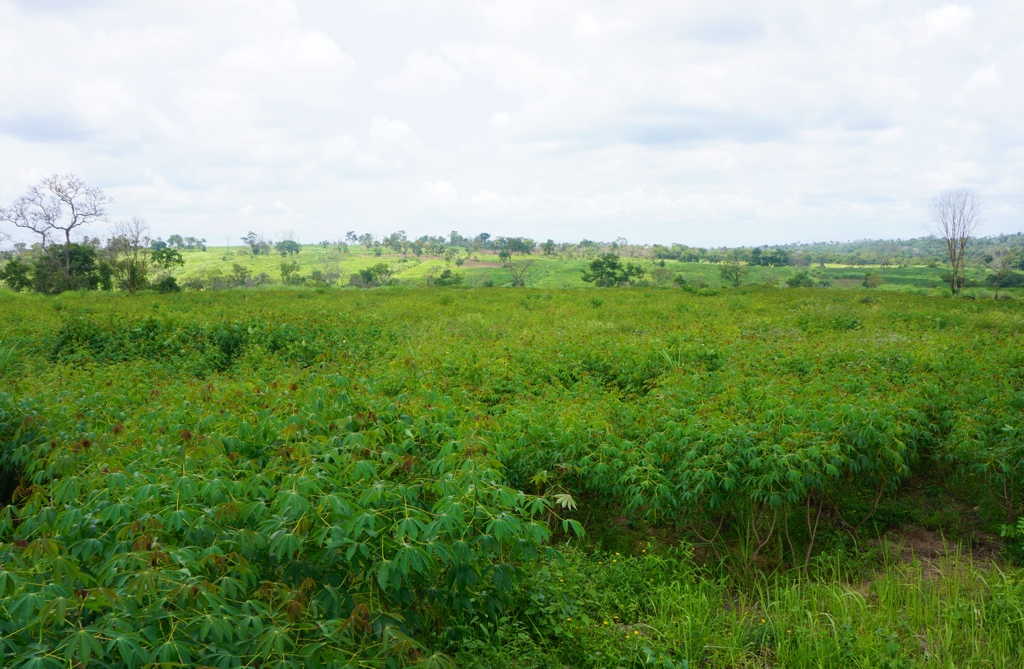
The region is lovely, physically, with mountains and rain forest areas. Infrastructure needs work as many of the roads are bad. However, the time spent driving is not wasted, as it gives us an opportunity for discussion with the minister, secretary and consultant, both on what we’re seeing, what the long-term plans are and matters extraneous to agriculture. For example, in talking about attracting industry to Nigeria, the secretary told us that one major obstacle is the lack of sufficient and reliable electrical power.
From the cassava area, we drove to a place where a cooperative of farmers was growing rice, and processing some of it themselves in a small wooden building. We had a chance to talk to the farmers and to see the processing facility.
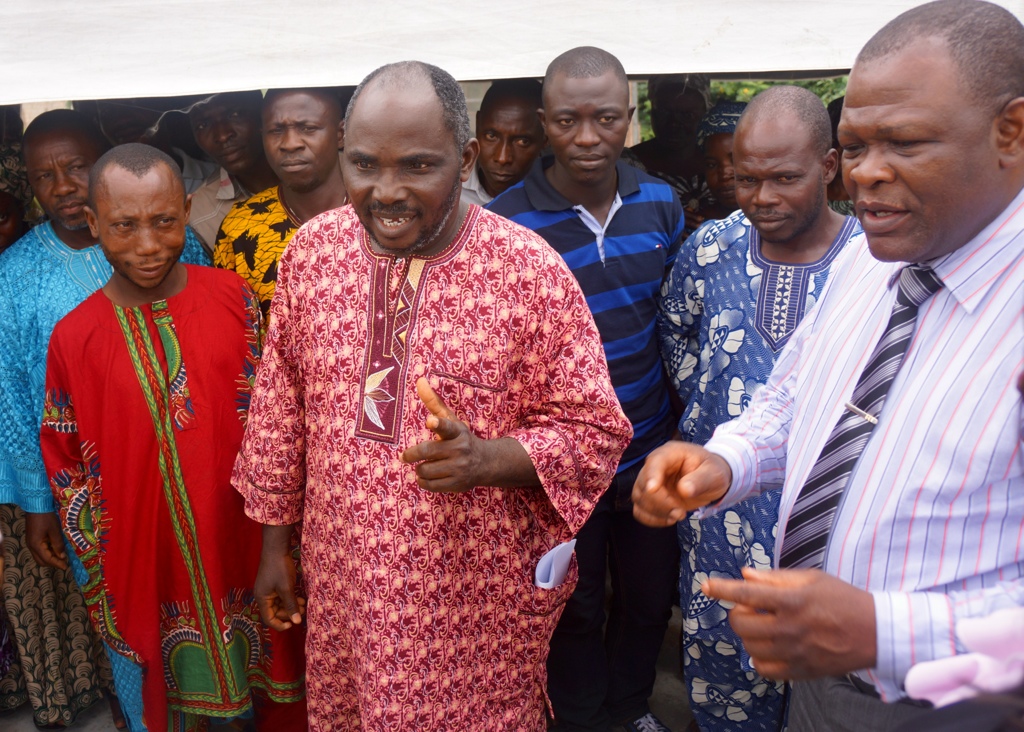
Processing rice and other commodities is very important to the ministry’s plans, because processing adds greatly to the value and therefor the profitability of the operation. Where product is sold raw, most of the profit inures to the benefit of the country doing the processing. We drove a short distance to some of the rice fields where, donning heavy rubber boots, we walked to the muddy fields and heard about the planting and harvesting.
We drove to an area of both natural hot springs and cold water streams. Recently a resort has been constructed and a long wooden pathway has been built through the very pretty area of trees and other vegetation up to the springs. This would be a pleasant area to come to relax and get away, as Funmi and Sola have done a number of times. It also looks as if it would have been a nicer place to stay than The Fountain (I think my initial B- grade was probably a bit generous).
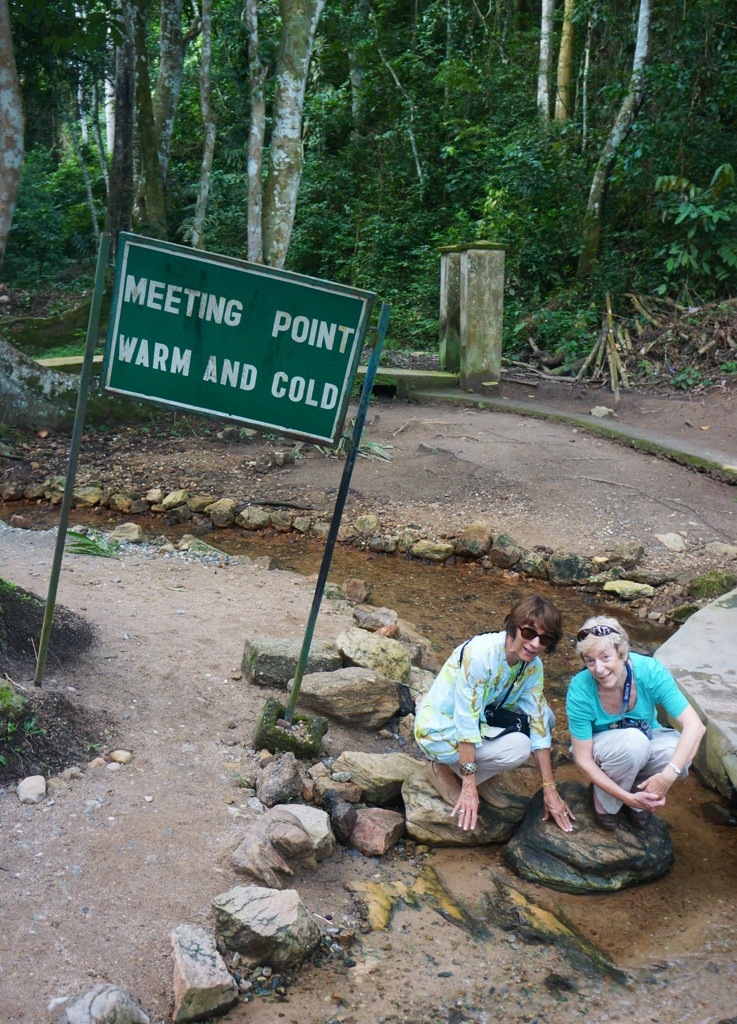
Back to our hotel for a quick shower and change into the fancy clothes we’d been told to bring. We all looked pretty spiffy, if I say so myself, especially Funmi in her dress and spectacular head scarf.
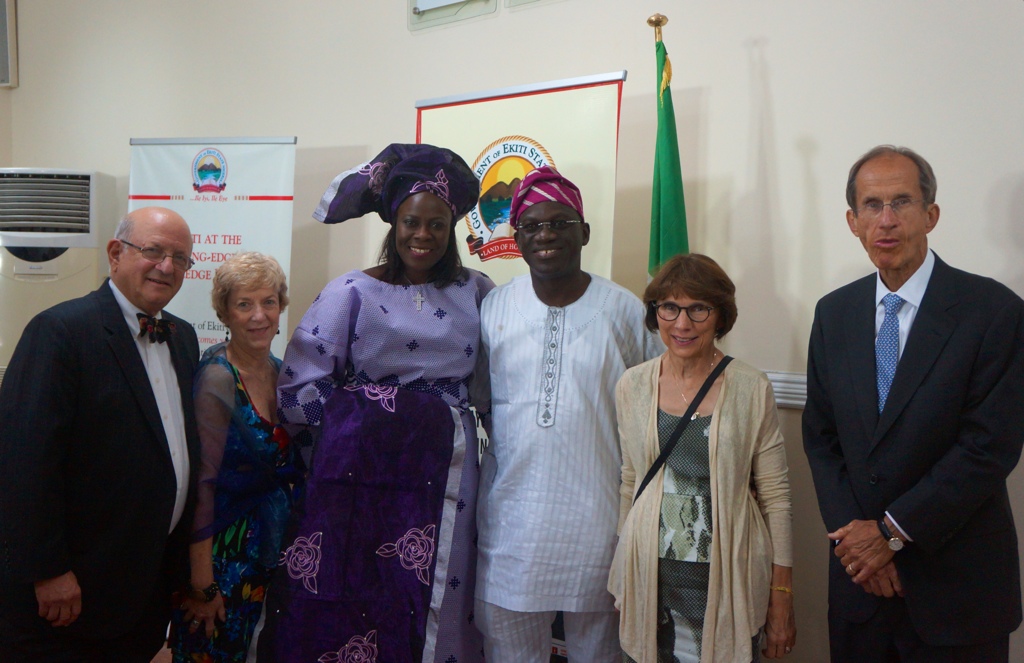
Over to the governor’s compound where the new Ekiti Knowledge Zone project was launched in a large conference room with people seated around a square table. Much preparation and thought has been given to an ambitious (some might say very unrealistic) effort to convert Ekiti, over a generation or more, into a sort of Silicon Valley of Nigeria. Long introductions of the steering committee were made. They are an impressive and diverse group of people, and include Funmi as a member. (An aside here on diversity. We and the Kipharts are adding great diversity to the areas in which we travel. Other than Miles, we are the only white people we’ve seen. Funmi told us that the people who gathered at Mama’s house, and probably many others we’ve encountered, have never seen a white person before.). Several speeches were made, including a couple less-than-impressive presentations by consultants to the committee. The governor formally launched the program in a rather short keynote speech. Photos were taken and then we lined up for a buffet dinner, definitely not lavish, which we ate at the conference tables. This was not the fancy event we had anticipated.
After dinner, Carol and I reconnected and chatted with the deputy governor, who we had sat next to at the dinner the other night, and who had been in education prior to her present position. We both like her, as she appears to have a great sense of humor and a real twinkle to her. We’ve told her that she must come to visit us in Chicago. She and the governor are elected as a pair, in the manner of our president and vice president, and she is confident that they will be reelected next year for another four year term, though she says that they need to be careful that the election is not stolen from them.
Dick, Susie, Carol and I are all filmed, responding to a question about our impressions of Ekiti. At the end, the four of us are asked to put four fingers up on each hand and move them forward and back towards the camera in a signal that the governor should be reelected to another four-year term. It was a surprise to us to learn that in only two days in Ekiti we’d become political operatives.
After exchanging goodbyes and thanks with the governor, we are driven back to the hotel.
August 25
Up early for a 7:00 departure.
Our time in Lagos was great, clearly highlighted by the people we met. I don’t feel that I have a very good sense of Lagos, as a city, though. All of the Nigerians we’ve met describe it as a vibrant, fast-moving, aggressive city on the order of New York. While I believe them, we did not really experience that ourselves.
We were picked up at the hotel in a van, sent by Ekiti State (of which, more later). In the SUV were a driver, guard and protocol officer. Another truck escorted us on our travels, siren sounding to clear the way. This entourage would accompany us until Tuesday.
Drove to the mainland portion of Lagos to the complex in which Sola’s 82-year old mother lives. Sola explained that the entire area around the buildings was completely empty when his father built it. Sola had been unaware of the project until his father took him there to show it to him, after it was completed. We walked a block, where Sola showed us a badly overgrown foundation for a building that was to have been a hospital that his father was building for him at which it was anticipated that he would practice after he returned from medical studies in the US. While Sola and Funmi were over studying, though, a military coup occurred, they did not return and the hospital was never built. A sign saying, “This land is not for sale” stands outside the property to deter people who do not own the property from purporting to sell it to another. Sola has thought about selling the property, but can’t bring himself to do that, because of what it was to have been.

We went up to the apartment to visit Sola’s mother and saw the obviously warm and tender relationship they have. At our request, his mama sang Sola’s Oriki, the praise poem that she sang to him as a boy, and still sings to him each time they talk. One of his sisters joined in the Oriki, then set out the brunch she had prepared for all of us, a task for which, as a caterer, she’s particularly well suited.
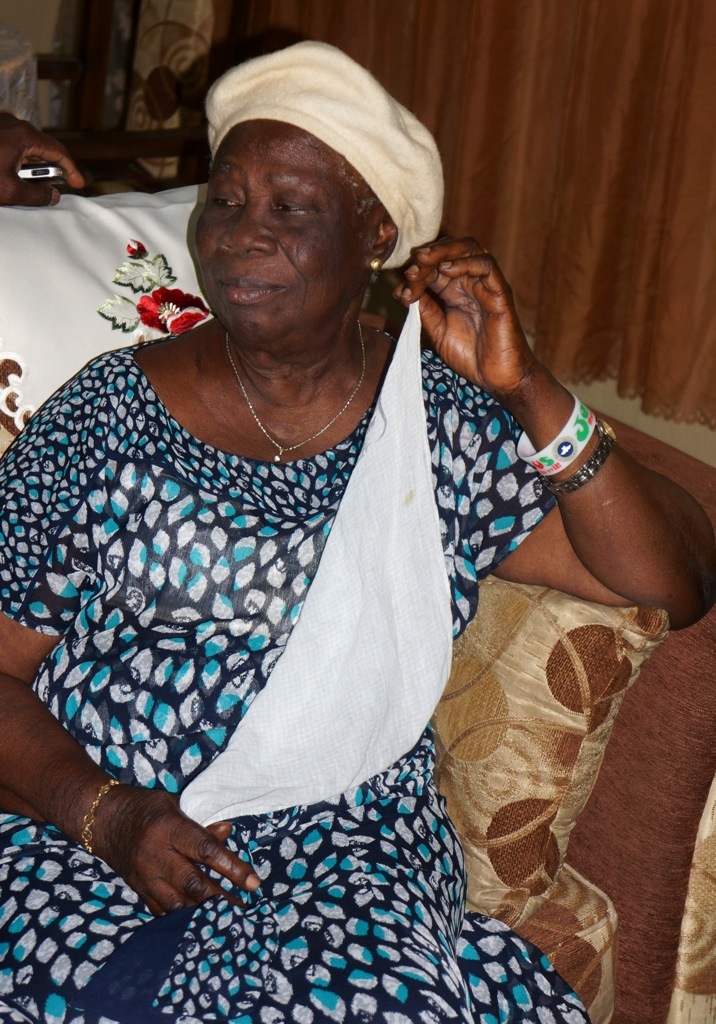
After saying our goodbyes, we set out on the long, 5-hour drive to Ekiti State, where Funmi grew up. We’d been warned that the roads were bumpy and bad, and they were, by US highway standards, but were far better than many we’d encountered in Ghana on past trips. The first several hours were flat and the roadside resembled a somewhat more urbanized Ghana, with open stalls selling various items, and assorted goats and cows grazing from time to time. The stores did not have the religious names that permeate Ghana stores. I did have a favorite large billboard that loomed above several port-a-potty-type units, “The Business of Shit is Serious Business.” I am not making this up, as several witnesses can attest, but we flew by quickly, and so I was unable to photograph it.
We drove by Ibadan, a red-roofed, sprawling city of some ten million, to which we will return on Tuesday. After a while, the land became hillier and forested, and eventually we reached Ekiti and drove to the Fountain Hotel, which is at best a b-minus, but will do for the next two nights. We spent a quick few minutes checking in and cleaning up a bit, before setting out to pay a “courtesy visit” on a US-educated king of a village in the area. We were greeted warmly by a bevy of colorfully-dressed chiefs, all of whom shook our hands and told us, “you are welcome.” Introductions were made in the very modest “palace” and several speeches welcoming us were given by chiefs in a language we could not understand. Then we were taken to the chief, before whom we kneeled, as he gave us individual blessings in English, wishing us long life, success, etc. After goodbyes and more handshakes, we drove to our next stop, “Mama,” Funmi’s 92-year old mother.
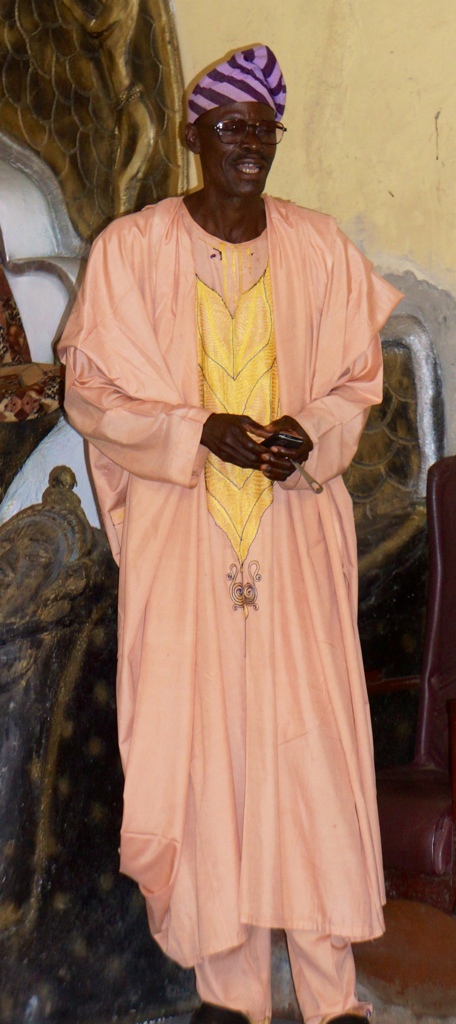
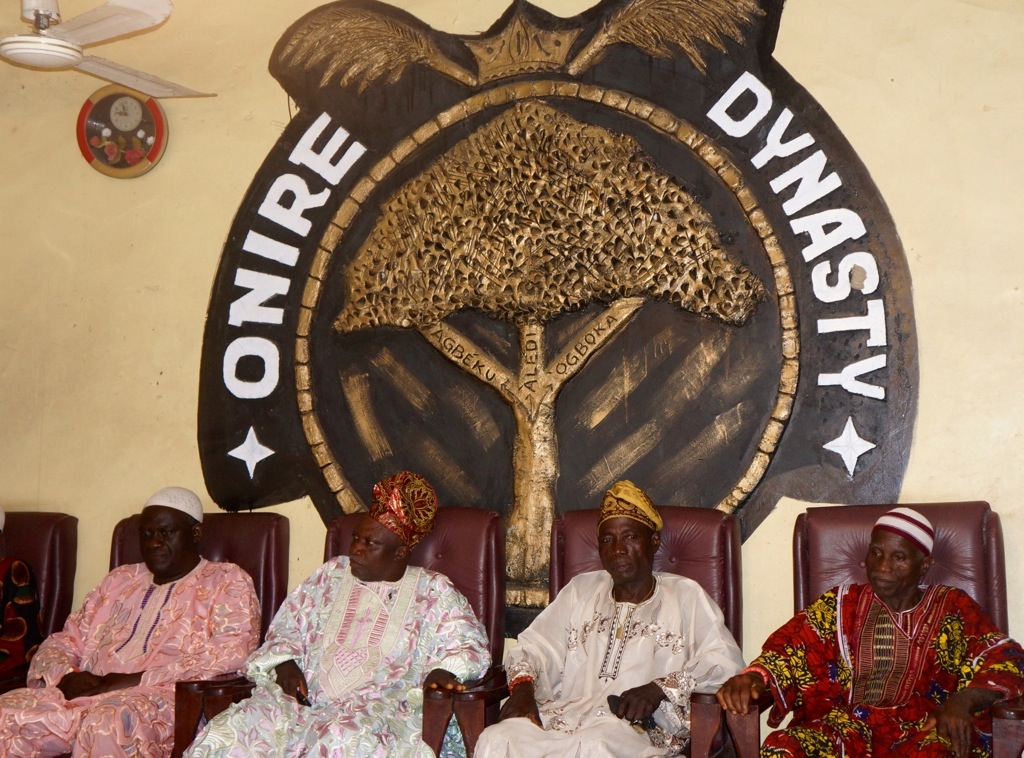
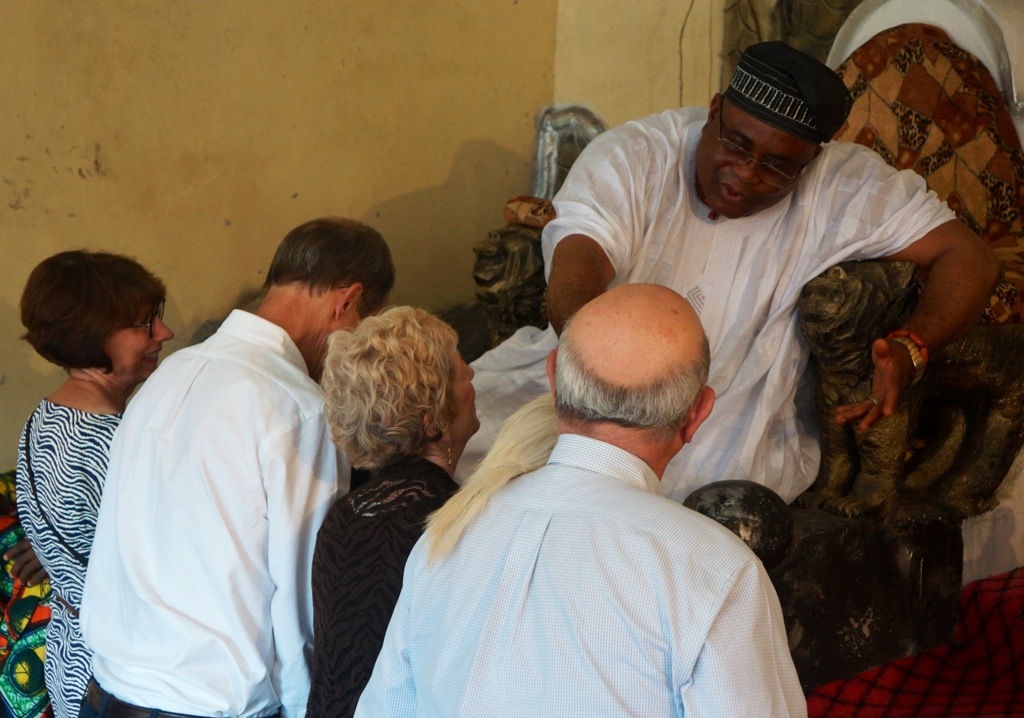
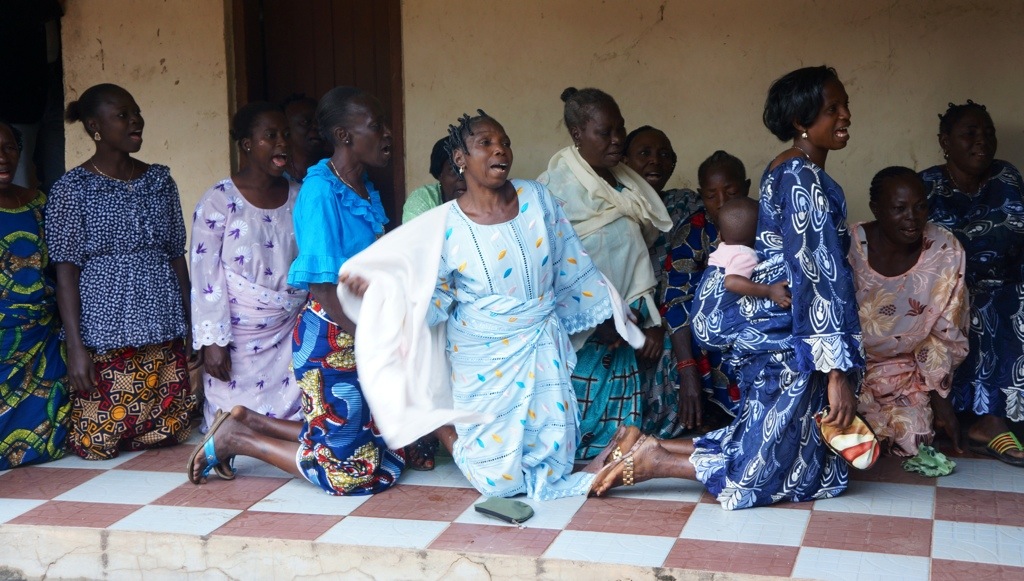
A large crowd had gathered there to greet us, shake our hands and tell us that we were welcome. Women serenaded Funmi, singing her Oriki, and we were ushered in to meet a lovely and smiling Mama with whom Funmi seems to share the same warm relationship that Sola and his mother have, and then shown into the dining room for another meal. After the meal we discussed the farming situation in the area with five farmers, which included farmers having to accept the prices offered to them without negotiation. Water is a huge problem, with there being very few wells offering safe water.
After the meal we went back in to see Mama, and she sang Funmi’s Oriki, accompanied by young women who sang verses that we later found out were both praising and roasting Funmi. We met Precious. Mama was a care giver to Precious, a very cute 3-year old girl, who was the daughter of a health service worker, who had lived with Mama for many years.
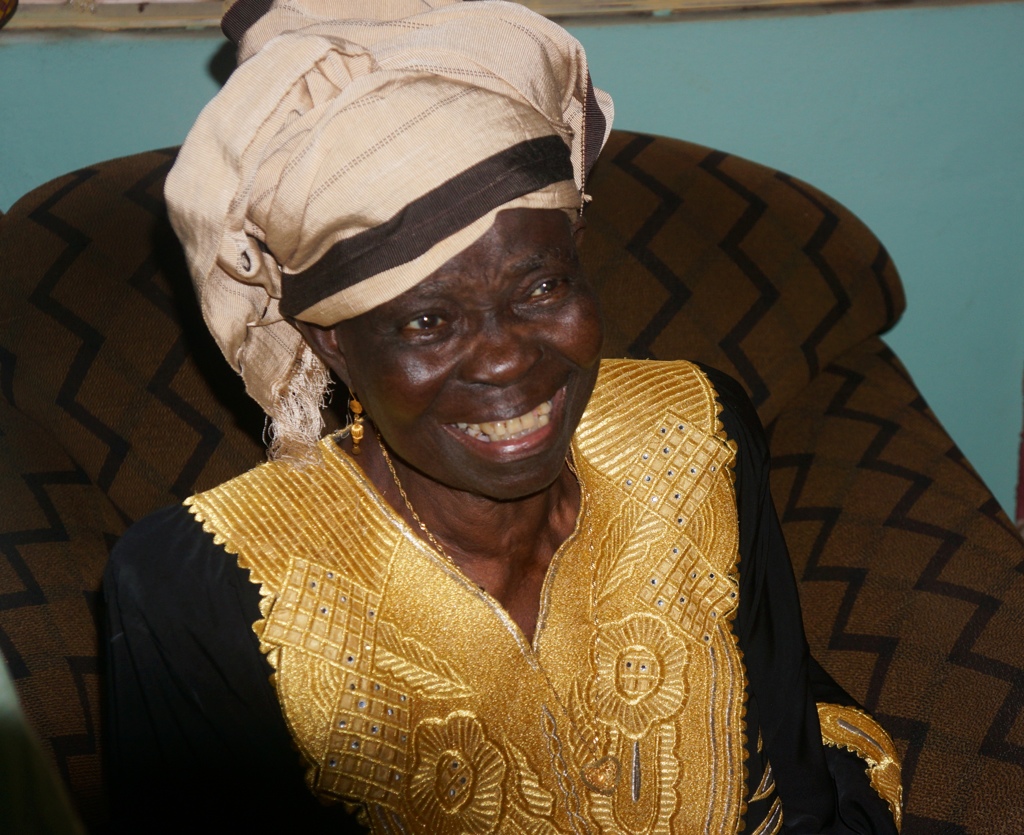
We set off again, behind sirens to our final stop, the home of Governor Fayemi and his wife. The governor is a perhaps 50-year old man who received his PhD in War Studies in England. He seems a very engaging, genuine, progressive, straight-forward person who is interested in helping his people. We’d all been given rather impressive, 130-page, large books, loaded with statistics and color photographs trumpeting the programs he’d initiated, and which he obviously hoped would lead to a second 4-year term in next year’s election. His wife has been active in feminine causes in Africa, and they lived together in Ghana for a good part of the past decade. In the large parlor, we exchanged introductions for about half an hour with the ministers of agriculture, trade, education, women’s issues, health and the deputy governor, all of whom joined us for a rather lavish buffet dinner and pleasant conversation in the dining room. Both in the parlor and the dining room, large flat screen TVs were tuned to a soccer match, though nobody appeared to be watching it.
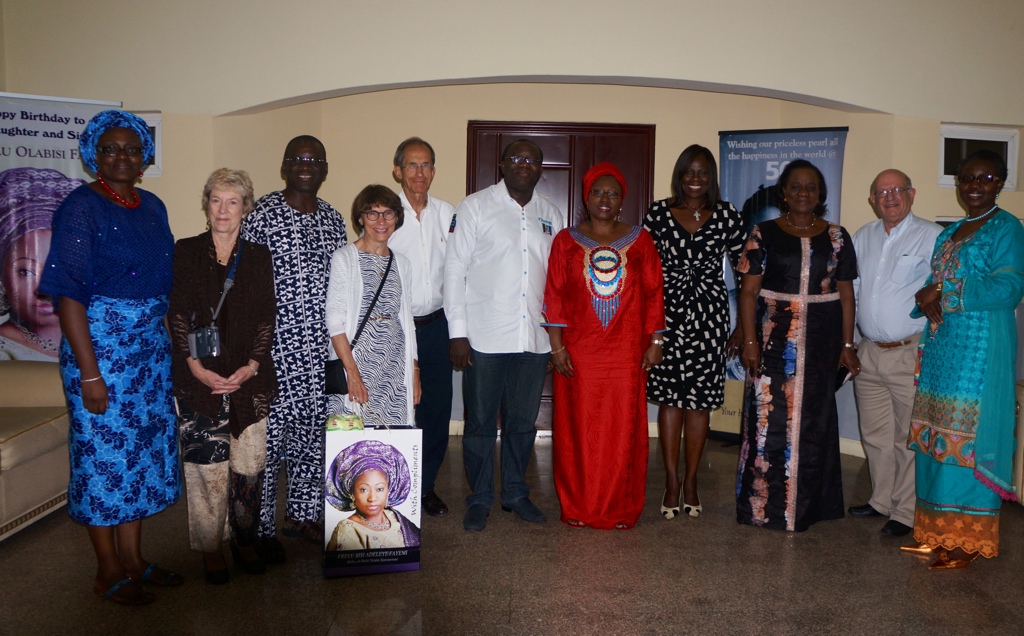
All of these introductions, welcomes and pomp are rather uncomfortable for Carol and me, since the major contribution we’ve made to deserve all this is to have been Dick and Susie’s friends for forty years. It certainly is a privilege to be included in each step, though.
On our way out, the governor’s wife gave each couple gifts in a large shopping bag bearing the words “with compliments” and printed with a large, attractive picture of her. Weary, we headed back to our hotel, and crashed.
|
|





































